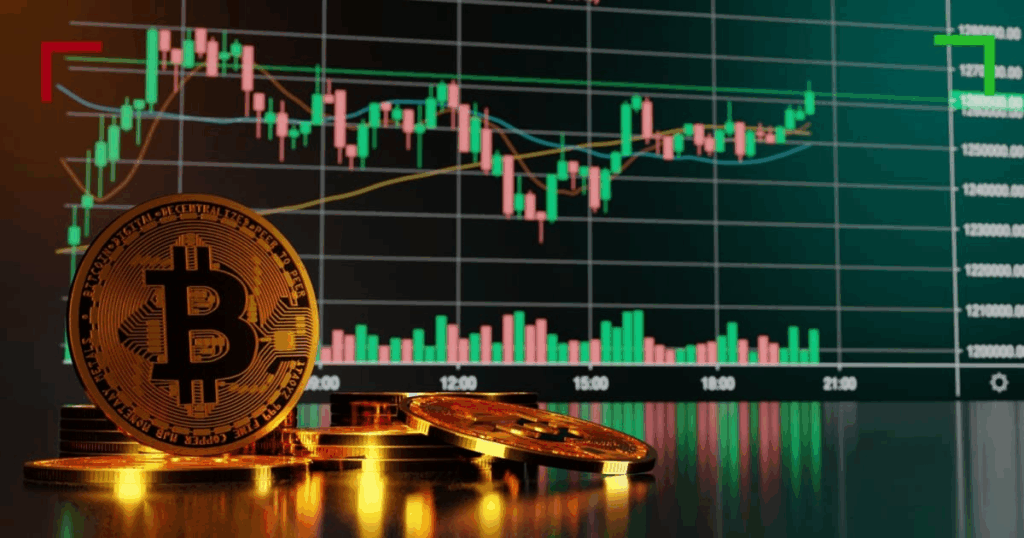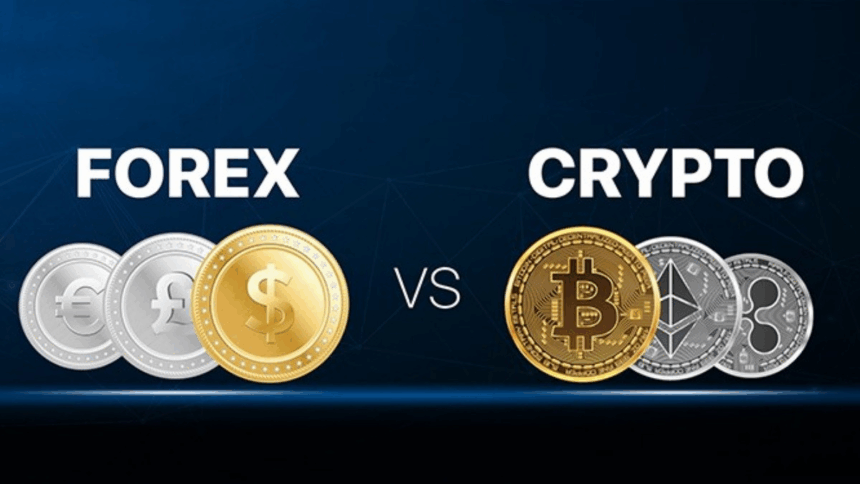This article will explore the fundamental differences between cryptocurrency and forex trading. Each has its own advantages and I will help you determine which one aligns with your targets.
While trading forex means dealing with traditional government-backed currency pairs, in cryptocurrencies you will be trading assets like Bitcoin and Ethereum. While both markets can be profitable, they can be wildly different in terms of regulation, accessibility, volatility, hours of trading, and legal requirements.
What Is Forex Trading?
Foreign exchange (Forex) trading involves buying and selling different currencies in the exchange market with the aim of gaining profit. Traders focus on the changes in the value of the currencies in pairs such as the EUR/USD or GBP/JPY.
Forex is the largest and most liquid market in the world, with a daily trading volume more than $7.5 trillion according to the Bank for International Settlements (BIS).

The Forex market is open 24 hours a day, five days a week as it shifts between the Tokyo, London, and New York financial centers. Each market trading session is highly influenced by the economic fundamentals of the market.
The high liquidity, low investment requirements and trading in leverage attracts huge crowds. In summary, Forex is a market with great liquidity, global reach and fast trading opportunities. It is influenced by global economic and political changes.-
What Is Crypto Trading?
To put it simply – Cryptocurrency Market Trading is buying and selling cryptocurrencies, (for example, Bitcoin and Ethereum) which is digital decentralized assets not regulated by any government and are stored in blockchains unlike other assets at banks and government financial systems.

The first market for trading cryptocurrencies ( Bitcoin) opened in 2009. Since then, over 10,0000 cryptocurrencies have been created and stored in blockchains and are available for trading.
Another key feature of cryptocurrencies is that trading can take place 24/7. Since there’s a lack of trading and market limits, it is very common for prices to become volatile ( lose or gain 10%% or more) in a very short time.
12 Key Differences Between Crypto vs Forex Trading Explained
| Difference | Crypto Trading (≈70 Words) | Forex Trading (≈70 Words) |
|---|---|---|
| 1. Nature of Assets | Crypto trading involves digital assets like Bitcoin, Ethereum, and thousands of altcoins that operate on decentralized blockchain networks with no central authority controlling supply. Their value depends on adoption, utility, technology upgrades, tokenomics, and market sentiment. Crypto assets represent emerging digital finance and innovation, but their lack of governmental backing introduces higher volatility, uncertainty, and speculative risk, making trader education crucial for long-term success. | Forex trading involves national fiat currencies like USD, EUR, and GBP, which are created and regulated by central banks and tied to real economic performance. These currencies support global trade, tourism, and international finance. Their market behavior is influenced by economic data, interest rates, monetary policy, and geopolitical stability. Forex assets are fundamentally stable compared to crypto, making forex ideal for traders prioritizing predictable economic-linked market movements. |
| 2. Market Size & Liquidity | Crypto has a market value around $1–3 trillion, with liquidity concentrated in major coins and top exchanges. Smaller tokens can suffer from slippage and limited buyers. Liquidity levels change rapidly with hype cycles, making large trades risky during low volume periods. However, this environment creates major profit opportunities for volatility traders willing to accept higher risk for higher reward potential. | The Forex market trades over $7 trillion every day — making it the most liquid financial market globally. High liquidity ensures minimal slippage, tight spreads, and smooth execution even for extremely large positions. Major currency pairs maintain steady demand due to global economic dependence. Forex traders benefit from stable market depth, but returns are usually slower, making leverage an important tool for profit generation. |
| 3. Trading Hours | Crypto markets operate 24/7/365 because blockchain networks never shut down. Price movements continue on weekends and during global holidays, creating constant opportunities but also continuous exposure to risk. Major news events can move prices at any time, requiring traders to use alerts and automated tools to manage positions effectively across all time zones without missing sudden volatility spikes. | Forex markets operate 24 hours a day only on weekdays, following major financial trading sessions such as Tokyo, London, and New York. Weekends and holidays result in market closure, giving traders downtime to analyze performance. While Forex offers fewer trading hours, session-based volatility helps traders plan strategies, avoid over-trading, and operate within defined liquidity windows for controlled risk management. |
| 4. Regulation | Crypto regulation varies widely across countries — some embrace innovation, others restrict it heavily. Most markets still lack complete investor protection rules. This creates freedom and accessibility but also risk from scams, exchange collapses, and market manipulation. Traders must check compliance status of platforms, especially for taxation and legal withdrawals, to ensure asset safety and financial accountability before investing or trading actively. | Forex trading is tightly regulated worldwide by major financial authorities to protect traders and ensure fair pricing. Brokers must comply with strict capital, reporting, and consumer protection rules. Traders benefit from strong legal oversight, insured accounts, and reliable fund security. However, regulation means entry requirements and restrictions in some regions, limiting accessibility for traders without financial qualifications or documented identity verification. |
| 5. Volatility | Crypto experiences extreme volatility — double-digit daily moves are common due to speculation, liquidity gaps, and sudden news. Sharp swings offer high profit potential but equally high probability of loss. Risk management and stop-loss rules are essential. Volatility makes crypto a preferred market for day traders and momentum traders seeking fast returns across short-term trading opportunities. | Forex volatility is lower because currency values reflect national economic performance, resulting in gradual, steady price changes. Major pairs rarely move more than 1–2% per day. This stability supports professional trading strategies, including hedging, carry trading, and long-term macroeconomic forecasting. Lower volatility offers lower downside risk but requires larger positions or leverage for higher profits, making disciplined capital control a must. |
| 6. Price Influences | Crypto price movements depend on network upgrades, halvings, tokenomics, adoption news, exchange listings, regulation changes, whales, and social media sentiment. Fear and hype often dominate valuation, causing sudden rallies or crashes disconnected from fundamentals. Traders must track community behavior, technology developments, and viral market trends closely to predict momentum and adapt quickly to emotionally driven price cycles. | Forex price movements depend on economic indicators such as inflation, unemployment, interest rates, GDP reports, central bank speeches, and geopolitical events. Fundamental analysis plays a major role in forecasting price direction. Traders must follow global financial news and macroeconomic models to evaluate strengths and weaknesses between currency pairs and execute informed decisions aligned with real-world financial changes. |
| 7. Participants | Crypto attracts retail traders, tech startups, miners, institutions, and decentralized communities — creating unpredictable behavior. Retail traders often drive trends through social platforms like X and Reddit. Market influence shifts rapidly when whales make large moves. This participant mix leads to irregular liquidity and sentiment-driven volatility, requiring traders to remain alert and react fast to speculative waves. | Forex involves government bodies, multinational corporations, banks, hedge funds, and institutional investors with massive capital and real-economic purposes. These participants maintain steady order flow and liquidity. Their strategies are more data-driven and longer-term, reducing erratic price behavior. Retail traders are a smaller segment, meaning less influence on market moves and reduced manipulation risk across major currency pairs. |
| 8. Security | Crypto relies fully on digital infrastructure — wallets, blockchains, private keys. Security threats include hacks, rug pulls, phishing, and irreversible asset loss if keys are misplaced. Self-custody offers independence from third parties but demands high personal security responsibility. Traders must use hardware wallets, multi-factor authentication, and trusted exchanges to reduce vulnerability to cyber-attacks and technological failures. | Forex markets operate through regulated banks and brokerage institutions using secure financial networks. Funds typically remain protected by insurance policies and strict regulatory monitoring. Traders face lower hacking risk, though fraudulent brokers still exist in unregulated regions. System stability and legal safeguards allow Forex traders to focus on strategy rather than security concerns, making it a safer environment for traditional financial participants. |
| 9. Trading Costs | Crypto transaction fees depend on blockchain congestion and exchange fee models. Gas fees can spike dramatically during peak activity, making some trades expensive. Frequent traders must choose low-fee networks like Solana and optimized exchanges to stay profitable. Hidden costs may include withdrawal fees, slippage, and staking lock-ups — requiring strategy planning before executing high-volume trading. | Forex brokers usually charge spreads, commissions, and swap fees for overnight positions. Costs are more transparent and predictable due to regulation. Major currency pairs benefit from extremely tight spreads because of high liquidity. Traders can minimize expenses by choosing the right pair, session timing, and regulated broker. Leverage costs must be monitored to avoid unnecessary capital drain while holding positions. |
| 10. Manipulation Risk | Crypto faces higher manipulation due to lower liquidity and limited regulation — including pump-and-dump schemes, fake volume, and whale dominance in smaller markets. Sudden moves often stem from emotional consensus rather than economic logic. Traders must analyze real liquidity, avoid hyped tokens, and rely on technical indicators to filter false breakouts and protect against rushed market traps. | Forex manipulation is harder due to strict supervision and trillion-dollar market size, though occasional scandals still occur. Market movements rely more on macroeconomic logic and institutional execution rather than social influence. Economic announcements create predictable volatility conditions that professional traders can prepare for. Lower manipulation improves trust and allows slow steady profit building aligned with financial fundamentals. |
| 11. Technology Dependence | Crypto exists fully through blockchains and smart contracts. Technical issues like network congestion, bugs, or chain attacks can directly impact trading safety and execution. Upgrades must be monitored to adjust strategies. Traders benefit from cutting-edge automation but must understand wallet systems, blockchain mechanics, and exchange reliability to avoid irreversible mistakes. | Forex uses advanced electronic trading platforms, but the underlying currencies do not depend on new technology for value. Infrastructure is well-established and stable. Technology enhances speed and charting but does not affect fundamental asset performance. Traders can rely on decades-tested systems with minimal risk of collapse due to technical failures, making execution more dependable and consistent. |
| 12. Fundamental Purpose | Cryptocurrencies aim to revolutionize finance through decentralized control, smart contracts, Web3 services, borderless payments, and digital ownership. Their growth depends on adoption and technological evolution. Crypto trading lets individuals invest in the future of digital economics but comes with uncertainty related to long-term success and regulatory outcomes. | Forex supports global economic functioning by enabling currency exchange for trade, investment, and travel. Value strength is tied to national economic health and monetary policy. Forex trading reflects today’s real-world financial needs and offers stability, making it an essential global system. Returns are more structured and economically grounded, appealing to institutional traders and macro-focused strategies. |
Advantages and Disadvantages of Forex Trading
Due to its abundance, Forex trading has become a preferred and popular financial market over the years. With this popularity also come various risks. Below, we’ve outlined the main benefits and risks of Forex trading.
Advantages of Forex Trading
Unmatched Liquidity and Stability
With over $7 trillion traded each day, the Forex market is the most liquid market in the world. Even during periods of extreme market conditions, traders can open and close positions with very little slippage. The deep liquidity of the market is valuable in estimating market prices and in executing orders effectively and consistently.
Sophisticated Trading Infrastructure
The Forex market has benefited from the development of automated trading systems and other professional trading systems which has advanced the market over the years. High-speed execution, real-time charting, and the provision of economic data facilitates traders designing highly sophisticated trading systems. The technological market Forex trading systems far surpasss other emerging digital markets.
Leverage as Both Tool and Weapon
With leverage of 30:1 to 500:1 (depending on regulations), Forex traders can control large positions in the market and make a large profit in a very short period, all while starting with a very small capital account. Although a capital account of $1,000 can control over $50,000 worth of currency, the risk potential is great as well.
Regulatory Protection
Forex trading is well regulated by prominent authorities like CFTC, FCA, ESMA, and ASIC. There is a higher trust with lower counterparty risk as a result of client trust funds being protected and segregated, disputes being legally protected, and brokers having capital reserve requirements and insurance. Compared to cryptocurrency and decentralized markets, forex trading is much safer.
Disadvantages of Forex Trading
The Leverage Double-Edge
In forex trading, leverage can be your best friend and your worst enemy. It gives traders the ability to control large positions with small amounts of capital, but it also magnifies the potential loss of every losing trade.
When a highly leveraged trade goes against a trader’s position, massive losses, a margin call, and quickly losing the entire investment can happen in a matter of minutes.
The Challenge of Competing with Giants
Fore retail traders, the psychological dimension of the market adds another layer of complexity to an already difficult situation. Competing against central banks, large corporations, and hedge funds that have the power to shift currency values is one thing, but the covert market manipulation that is outside the normal retail market analysis is what separates the retail trader from the institutional trader. The lack of sophisticated analysis tools, and the inflated market spread add to the disadvantage.
Greatest Profit Potential Under Normal Conditions
The Forex market is always trading and gradually increasing in price and profitability potential. Without leverage, though, this profitability is scarce. Geared traders may lose sight of risk, particularly in dull markets, and increase the size of their positions or quantity of trades.
These conditions and the more volatile acosystems, such as crypto or commodities, do mean traders need technique and market patience in order to achieve profitability.
The Psychological Burden
The 24 hour technology of the Forex market allows traders to track it at any hour. The 24-72 hour train travel distance between any 2 non-contiguous states of the USA allows any system to be in constant use without interference.
The emotional, sleep, and mental fatigue that arises from this need is unbearable. The psychological profit and loss cycle of a trader can cause a complete market disconnect. Trading performance requires mental performance as well.
Advantages & Disadvantages of Cryptocurrencies
Astronomical Growth Potential
Cryptocurrencies have the potential to build enormous wealth. Bitcoin increased in value from $1 to over $60,000 within ten years. Newer altcoins like Solana, Polygon, and Avalanche achieved over 5,000% returns in value within a year.
Early cryptocurrency adopters and investors were able to access groundbreaking technologies, achieving returns on investment that were unimaginable in traditional markets. Hence, the cryptocurrency market is a targeted pursuit for high-risk, high-reward investors.
True Financial Sovereignty
Virtual currency removes the need for dependency on traditional banking systems. Users of self-custody crypto solutions like hardware wallets have complete control of their assets.
Institutions are unable to freeze, limit, or control access to an account, nor limit payments on an account. Such financial independence is critical in areas with captured controlled systems, authoritarian rule, or poorly functioning banking systems.
24/7/365 Market Access
Unlike stock markets with strict trading hours, crypto operates non-stop every day of the year. Investors can react to breaking news immediately, without waiting for markets to reopen. This constant accessibility democratizes opportunity and supports an active global trading environment, particularly for traders seeking flexibility beyond traditional time zones.
Rapid Innovation and Technology Growth
Until now, the crypto and blockchain industries have evolved faster than all legacy financial sectors. New DeFi protocols, NFTs, decentralized exchanges, and Layer-2 scaling technologies are released every month.
Most projects being open-source means collaboration and adoption can rapidly accelerate. This dynamic development makes entirely new categories of investments and offers early movers significant competitive and financial advantages.
Disadvantages of Cryptocurrencies
Heart-Stopping Volatility
Extreme and unpredictable price swings are an undeniable characteristic of crypto. Bitcoin has experienced 80%+ crashes for prolonged periods and some altcoins can drop 90-99% in bear markets.
Sudden and violent price swings can lead to severe emotional distress, and portfolios can evaporate in moments. This fear and greed trap makes many investors sell low and buy high, making crypto success as much a psychological challenge as a financial one.
Security Vulnerabilities & Permanent Loss
Technical responsibility is paramount when owning crypto. Lost private keys or seed phrases results in fully lost and irretrievable funds. It is estimated that $140 billion in Bitcoin is permanently lost.
Wallets and exchanges face hacks, phishing attacks, and smart contracts exploits that drain funds. User Fraud, and support, and most importantly, recovery are virtually nonexistent. Hence, user security is vital in these systems.
Regulatory Uncertainty
With crypto assets still undefined, regulation and laws toward them are still in the formative days. New legislation or bans instantly collapse market confidence and valuations. History, like with China’s mining bans or U.S. SEC enforcement actions, serves as a reminder.
Assets considered legal and stable today may be deemed an unregistered security and thus illegal tomorrow. Shifting legal frameworks in the space lead to the unpredictable risk of changes in liquidity, accessibility, and taxation.
Scam-Filled and Manipulated Market
The Fraud Void in crypto and the systems that support it is largely due to anonymity and limited oversight. In the recent past, the countless Rug pulls, fake ICOs, Ponzi schemes, and pump-and-dump groups with minimal risk and oversight have cost investors billions.
Even the best or most seasoned scam detectives face frustration over the lack of controls. Minimal due diligence might remove most of the risk, but the lack of controls, as stated above, is the most vital area in the industry.
Forex vs Crypto: Which Is Safer from a Regulatory Perspective?
In the case of forex vs crypto regulation safety, forex is more structured, controlled, and supervised than cryptocurrency. Regulatory safety for the whole world forex over the counter (OTC) market is controlled and supervised by central and major financial institutions and forex licensed brokers. Controlled and supervised forex brokers in Great Britain trading by the Financial Conduct Authority (FCA) along with the Bank of England ensure compliance by setting and enforcing supervisory frameworks around equitably trading client resource safeguarding, and mitigating systemic shortcomings.
In contrast, the world of cryptocurrency is self-regulated. Gaps in regulation and oversight leave users vulnerable to risks of fraudulent blockchain exchanges, rapid policy shifts, and resource theft. The crypto space is self-regulating by offering innovation and freedom; however, this lack of consistent regulation and policy protection means the security shortcomings associated with blockchain technology are largely the responsibility of the investor.
Conclusion
Both crypto and forex trading aim profiting from price movements, but they exist in different financial universe. The forex market has deep liquidity and low-risk has strong market infrastructure and regulations. In contrast, strong crypto regulations are missing, offering innovation and market growth but hostile trading conditions and extreme price movements.
Knowing these differential aspects will help one determine their desired financial objectives, trading style, and risk tolerance. Some like ossefing with global fundamentals and forex market consistency, while the optimistic have crypto’s future rewards. Most prospects in the changing global finance can be accessed with strong diversified trading and the right strategy.
FAQ
Is crypto more profitable than forex?
Crypto can be more profitable due to extreme volatility, but that same volatility dramatically increases risk. Forex profits are usually smaller per trade but more consistent, especially when using leverage responsibly.
Which market is safer to trade?
Forex is typically safer because it is regulated worldwide and backed by major financial institutions. Crypto remains partially regulated, with risks like hacks, scams, and sudden market crashes.
Do both markets operate 24/7?
Crypto operates 24/7 year-round, including weekends and holidays. Forex is available 24 hours a day, but only 5 days a week aligned with global financial hubs.
Can I trade crypto on the same platforms used for forex?
Yes, some brokers and exchanges now offer both asset classes, but always ensure platforms are properly licensed and provide secure custody solutions for digital assets.









